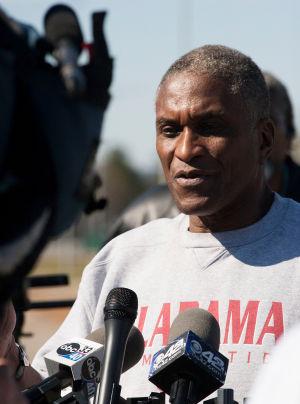
Johnny Ford
Alabama Governor Robert Bentley signed an executive order on his first full day in office that violated the rights of voters in majority-black Macon County.That is the primary claim in a federal lawsuit that states Bentley and Attorney General Luther Strange were part of a white, Republican effort to heap "economic devastation" on Macon County residents by unlawfully closing the VictoryLand casino.
Lawyers for Bentley and Strange have filed Motions to Dismiss, characterizing the lawsuit as "frivolous," "baseless," and "insulting." They also claim the U.S. Voting Rights Act does not apply to facts alleged in the complaint. (See Strange and Bentley motions at the end of this post.)
But Tuskegee Mayor Johnny Ford and other Macon County plaintiffs argue in a response that Bentley's executive order, appointing Strange to enforce gambling laws in all 67 counties, effectively usurped the authority of the Macon County sheriff. In approving Constitutional Amendment 744, plaintiffs state, voters authorized the sheriff "to promulgate and enforce the rules and regulations related to bingo in Macon County." (See plaintiffs' response to motions to dismiss at the end of this post.)
The actions of Bentley and Strange amount to an "abolition of an elective office" that is covered under Section 5 of the Voting Rights Act, per a U.S. Supreme Court case styled Presley v. Etowah County Commission, 502 U.S. 491 (1992), writes Massachusetts-based plaintiffs' lawyer Donald LaRoche.
Plaintiffs also raise civil-rights claims of purposeful discrimination and fundamental unfairness. But given the Deep South's ugly history of obstructing minorities at the ballot box, voting-rights claims likely will resonate loudly with the public. Writes attorney LaRoche for plaintiffs:
Where the Alabama State Courts have repeatedly served as a rubber stamp to the recalcitrant majority officials and have ignored federal requirements, the plaintiffs' only recourse is to seek refuge in federal court and pray for an equitable relief. The defendants now move this Court to dismiss the plaintiffs' complaint in yet another attempt to deny Black Americans the enjoyment of their right to participate in the voting process and experience the sustainability of their choice.
The defendants fasten their discriminatory stratagem to a feeble distinction between bingo and electronic bingo, declaring the latter to be criminal without the benefit of legislation or final judicial determination. This impuissant attempt to argue that the electronic form of bingo is criminal and any use of these devices is a violation of the gambling laws of Alabama is simply another clandestine attempt to suppress and nullify the lawful passage of Amendment 744 and deflate the voting power of the people of Macon County.
At the heart of the controversy is a memorandum that Strange issued in May 2011, claiming Bentley's executive order gave the attorney general's office authority to determine what games amount to legal bingo in Alabama. Plaintiffs, however, state that Strange's memorandum is at odds with the Alabama Constitution, as outlined in Amendment 744. Writes LaRoche:
The Sheriff of Macon County, under his constitutional authority, approved the use of electronic bingo games. While the Attorney General may be authorized to 'enforce' the gambling laws in Alabama, as he is all other laws, the Alabama Constitution says that only the Sheriff of Macon County can devise regulations for the conduct and operation of bingo within Macon County. There are no general laws in Alabama which relate to bingo because it can only be authorized in a particular county by constitutional amendment. When Defendant Strange decided what bingo must be and issued his May 2011 memorandum, he usurped the authority which had been vested solely in the Macon County Sheriff. So while General Strange may have the authority to 'enforce' bingo regulations or general criminal laws, he does not have the authority to 'create' or 'promulgate' the rules anymore than he has the authority to 'create' or 'promulgate' general criminal laws (such authority being vested in the legislature).
All sides seem to agree that the U.S. Supreme Court's finding in Presley is central to the current dispute. All sides also reference Bunton v. Patterson, 393 U.S. 544 (1969), which was one of four cases--three from Mississippi, one from Virginia--that were consolidated on appeal.
The sides disagree how Presley and Bunton should apply to the situation unfolding in Macon County. The key question appears to be this: Do the actions of Bentley and Strange "rise to the level of a de facto replacement of an elective office with an appointive one"? Plaintiffs answer that question in the affirmative:
Defendant Bentley's Executive Order No. 1, repealing former Governor [Bob] Riley's Executive Order No. 44 and essentially appointing Defendant Strange as the new "anti-gambling czar," was clearly a usurpation of the authority constitutionally given to the Macon County Sheriff, as related to bingo rules and regulations. This action constituted changes affecting voting, and as such, was subjected to the preclearance requirement pursuant to Section 5 of the Voting Rights Act.
On the surface, Presley might not bode well for the Macon County plaintiffs. After all, the nation's high court found that the Voting Rights Act did not cover the facts in that case. But LaRoche makes a powerful argument that alleged wrongdoing in Macon County goes way beyond that found in Presley:
The Governor's executive order appointed the Attorney General, who in turn, replaced the officer designated by the constitutional amendments. This diminished the authority of the official whom the electorates of Macon County voted for by de facto replacing the elected office they solely entrusted with the promulgation and regulation of bingo rules by constitutional amendment with an appointed office. This goes way beyond merely changing the internal operations of an elected body, such as the Etowah County Commission in Presley.Macon Co Dismiss (Strange) by Roger Shuler
Macon Co Dismiss (Bentley) by Roger Shuler
Macon County--Response to Dismiss by Roger Shuler
